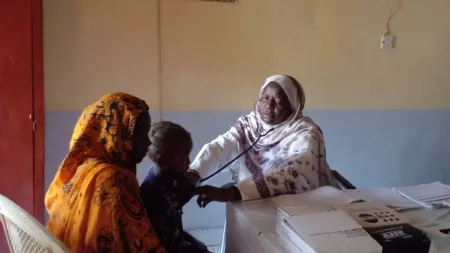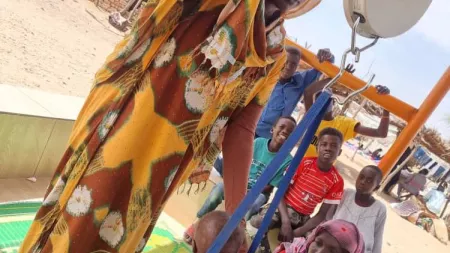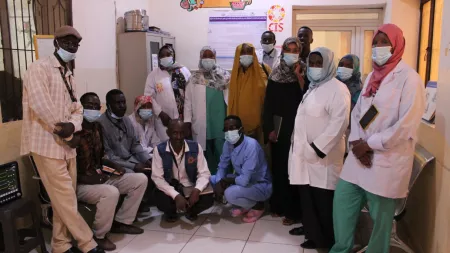It has now been over 4 months since the start of the conflict in Sudan. This means 130 days of widespread violence, severe supply issues of essential items such as fuel, food and medicine, subsequent increasing hunger and diseases, and massive displacement – 2.4 million people internally and over 700,000 fleeing to other countries. The rapid deterioration of infrastructure and the increasing humanitarian needs are a recipe for disaster in health services.
Many of the health facilities were looted and now medical supplies are running out alarmingly fast, putting high pressure on the remaining operational health facilities,said Farouk Mohammed, CARE International’s Health and Nutrition Manager in South Darfur, Sudan.
Despite the extremely challenging context and the escalating pressure, CARE Sudan, through the State Ministry of Health staff and Community Leaders, continues to provide critical healthcare to millions of people in need. CARE Sudan runs 14 health centers, nutrition facilities, and two stabilization centers in Nyala, Kass, Jebel Marra, and Bileil, cities in the Southwest and the central part of the country.

Amana and Fatima have recently needed healthcare support and highlighted how essential it is to maintain access to these services:
“My daughter came down with a cough and had a fever. I was not sure what to do as many of the clinics in Kass Kabeer were closed due to war. A neighbor informed me that CARE’s Mother and Child Health Center in the Al Khafah neighborhood is operational. The medical assistant examined my daughter and gave her some medicines for free. I was so happy about that as I had no money. Now my daughter is ok, and she started to play with her brothers and sisters,” said 36-year-old Amana.
“My child is suffering from malnutrition. I used to take him to get medical care and therapeutical feeding in the CARE Sudan clinic in Al Salam Internally Displaced People (IDP). When the war erupted, I was grateful that the clinic was still working. I bring my child every week for the nurse to examine him and verify that he has gained weight,” said 30-year-old Fatima.

Escalating challenges
Although CARE Sudan and our partners have been able to maintain these essential health services so far, challenges are escalating as the conflict continues. Low stocks and transportation of supplies are central issues:
“To deliver medical supplies to health facilities in South Darfur in July, we had to use donkey carts and public transport as no truck accepted the risk to make the trip,” explained Farouk.
He also highlighted what are the main concerns and needs in the near future:
“We are deeply concerned that medical supplies are running out in the state, and we need urgent solutions for safe transportation of drugs, therapeutical feeding, and other medical supplies into South Darfur and to the health facilities”.
To ensure all people in Sudan continue to have access to healthcare, more support will be needed from the international community.
CARE’s healthcare response since the start of the conflict
Between April and June 2023, CARE Sudan reached 13,132 patients through the outpatients’ consultations at our health clinics in South Darfur. 3,145 children and pregnant women were vaccinated against childhood and maternity diseases such as polio, whooping cough and Tetanus. During the same period, 2,462 women received reproductive health services, and 25,338 persons were reached through nutrition services including the treatment of severe malnutrition, and detection of malnutrition in children.
CARE’s work in Health and Nutrition is possible thanks to generous donations by USAID, Global Affairs Canada, and the German Bundesministerium für wirtschaftliche Zusammenarbeit und Entwicklung.
